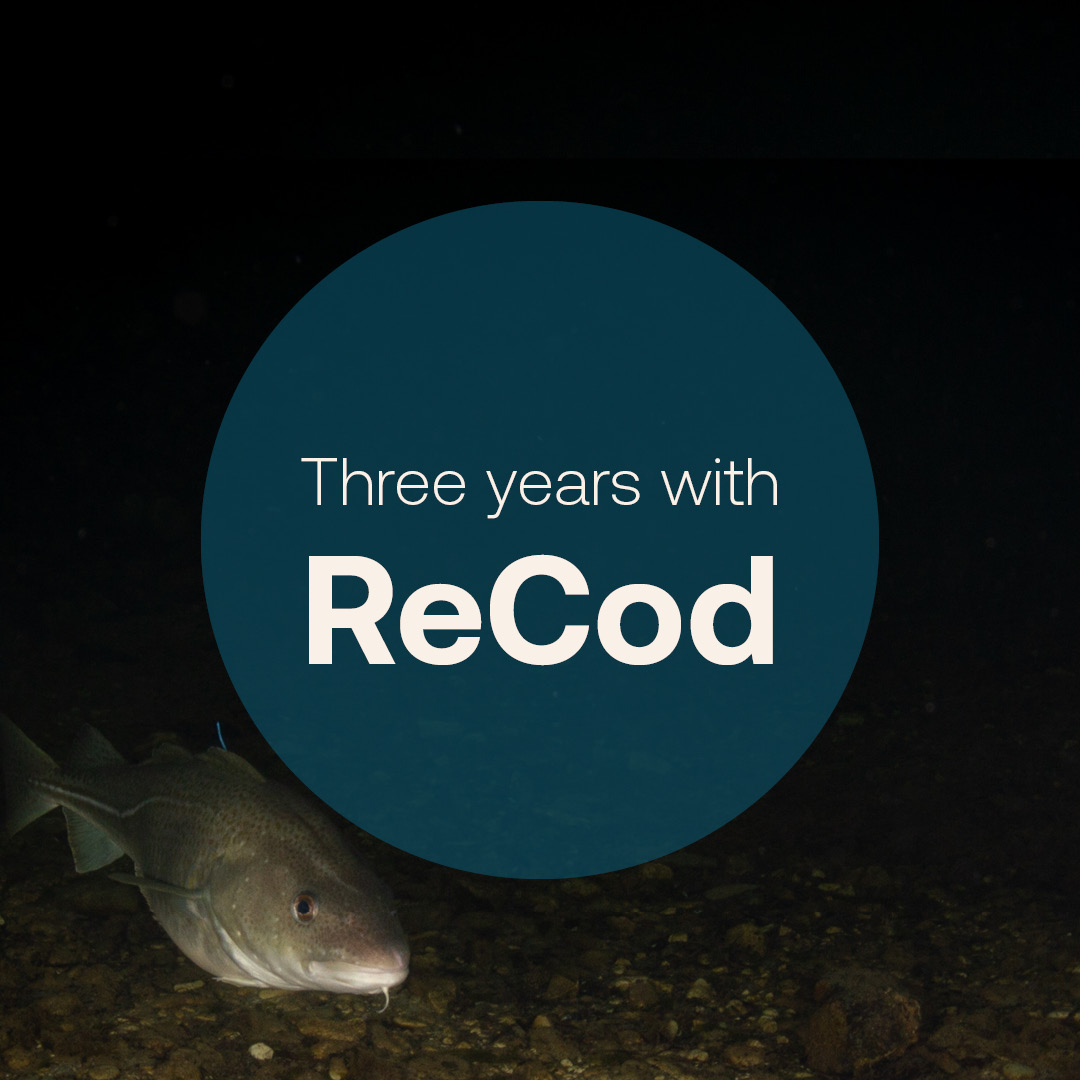The facilities at the Ar research station are slowly but surely being emptied. That topcoat I used to have to borrow to keep warm in the seven-degree cold rooms is hanging on a hook untouched. Once the large fish tanks have been emptied, and the parental fish released back into the Baltic Sea, the premises no longer need to be cooled down to maintain the right temperature for the fish. Susanne Ragnarsdotter, operations assistant within the project ReCod – release of small cod in the Baltic Sea, is busy dismantling a workbench. She is responsible for ensuring that the tanks and equipment are sent to the right final destinations. She is working her last days in the project, even though ReCod is far from over. But before Susanne retires, we met up with her to find out more about how she went from volunteering in Uganda to caring for Baltic cod in northern Gotland.
Susanne probably never imagined that she would spend the last three years working with Baltic cod. But we’re prepared to disagree, because if there’s one thing Susanne is, it’s multifaceted. When we ask her to tell us about her background, she laughs and asks how much time she has. Susanne spent almost 10 years at Uppsala University and many years working for the Red Cross and as a volunteer in Uganda and Zimbabwe. After studying on the Europe programme, she decided to broaden the Almedalen programme.
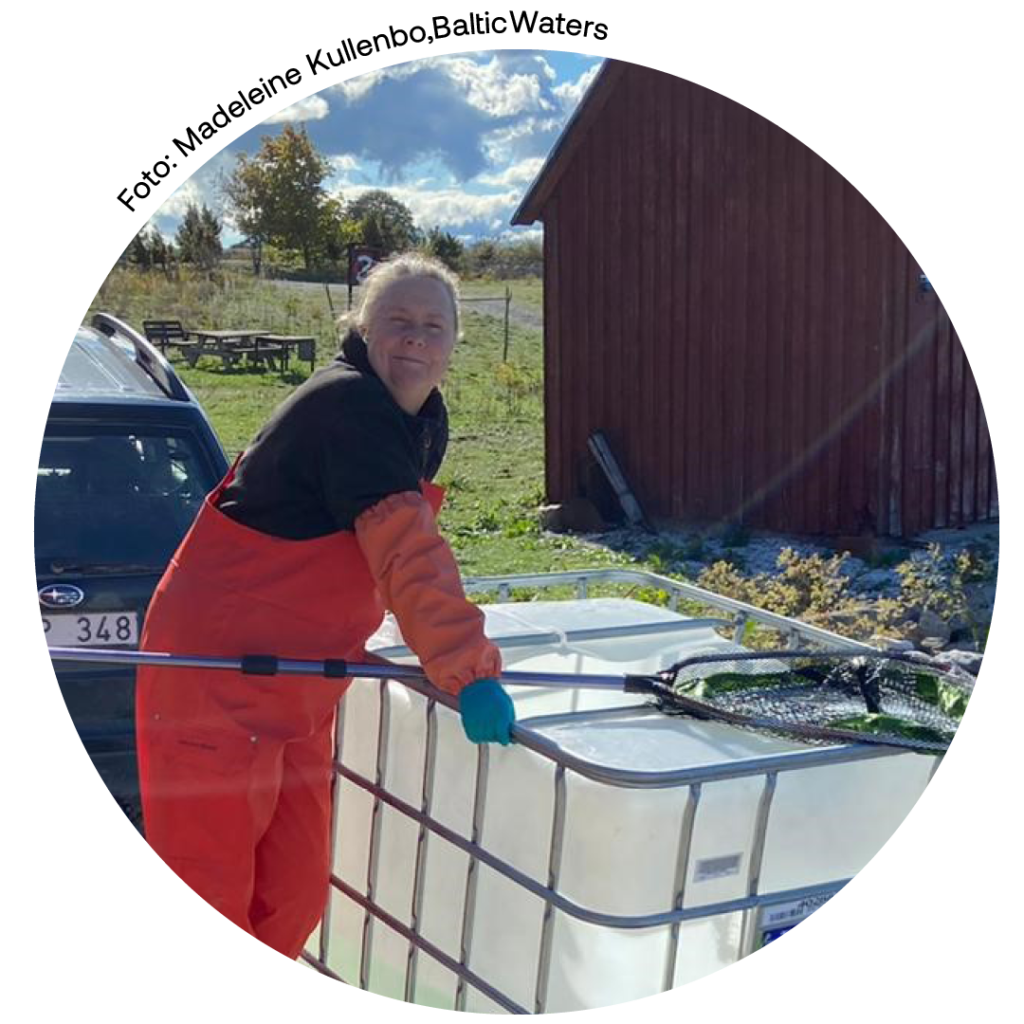
‘Around 2005, I noticed that the Almedalen programme focused only on national issues. But Sweden is part of the world. On a late night walk in Visby, it struck me that the empty silo in the harbour would be a perfect place to invite people to discuss global development,’ says Susanne.
Said and done. Susanne found funding and partners and sold the idea to the Red Cross. The result was workshops and seminars where different organizations collaborated and had their own stands where global development issues were discussed during the Almedalen week.
A few years later, Susanne bought a house in Fårösund, which she later developed into Kustparkens B&B – a bed and breakfast with a sustainability profile. It keeps her busy during the summer months, to say the least, but the winter months are much quieter.
‘One day I called the Ar research station to see if they needed help with anything. And not long after, I got a call that they needed weekend staff for a cod project – ReCod. But I didn’t know anything about fish,’ Susanne laughs.
That changed quickly! With the support of Johanna Fröjd, project manager for ReCod, Susanne learned how the station’s Recirculating Aquaculture Systems – RAS – worked, what is needed to keep all systems running correctly and handling and caring for the fish. After a few months, Susanne started working more hours within the project, with the exception of summers when she was off to run her B&B.
– It is a privilege to work with someone who cares as much about the cod and the project as Susanne. Susanne’s curiosity and willingness to learn new things combined with life experience has been incredibly important for the success of the project, says Johanna Fröjd.
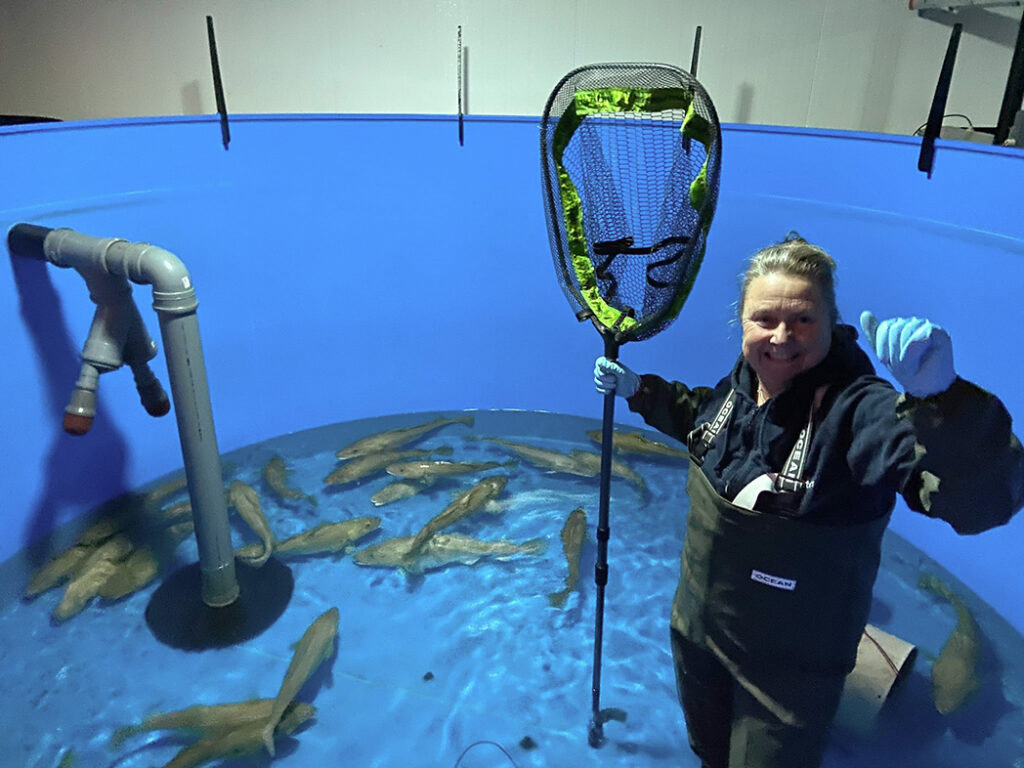
Susanne moving cod from one tank to another at the Ar research station. Photo: Johanna Fröjd, BalticWaters
What does a typical day look like as an operations assistant?
‘The morning always starts with checking the fish to make sure they are OK. Then I take water samples in the tanks and from the RAS to make sure that the values, temperature and amount of water in the system are correct,’ says Susanne.
The cod’s spawning season is what determines the work at the station. In the spawning season, when the cod reproduce and small cod larvae hatch for release into the Baltic Sea, the focus is on spawning, eggs, larvae and release. In the non-spawning season, the focus is on evaluation and planning for the upcoming spawning season and new intake of parental fish.
Even feeding varies over the year, with the spawning season being characterized by a more frugal, lean diet. This is because feeding fatty foods before spawning can jeopardize the female’s ability to release her eggs – a life-threatening situation.
‘When the female cannot release her eggs, the fish’s ability to dispose of urine is blocked and the fish get uric acid poisoning. With the lean diet, we can avoid the so-called egg bound syndrome,’ says Susanne.
Every season has its charm, but one is always a little extra special.
‘Once or twice a year, new cod from the Baltic Sea moves into the station, so that we can ensure genetic variation in the cod larvae that hatch. It’s always exciting – getting to know them, both as individuals and as a group, and making sure they are happy and healthy.’
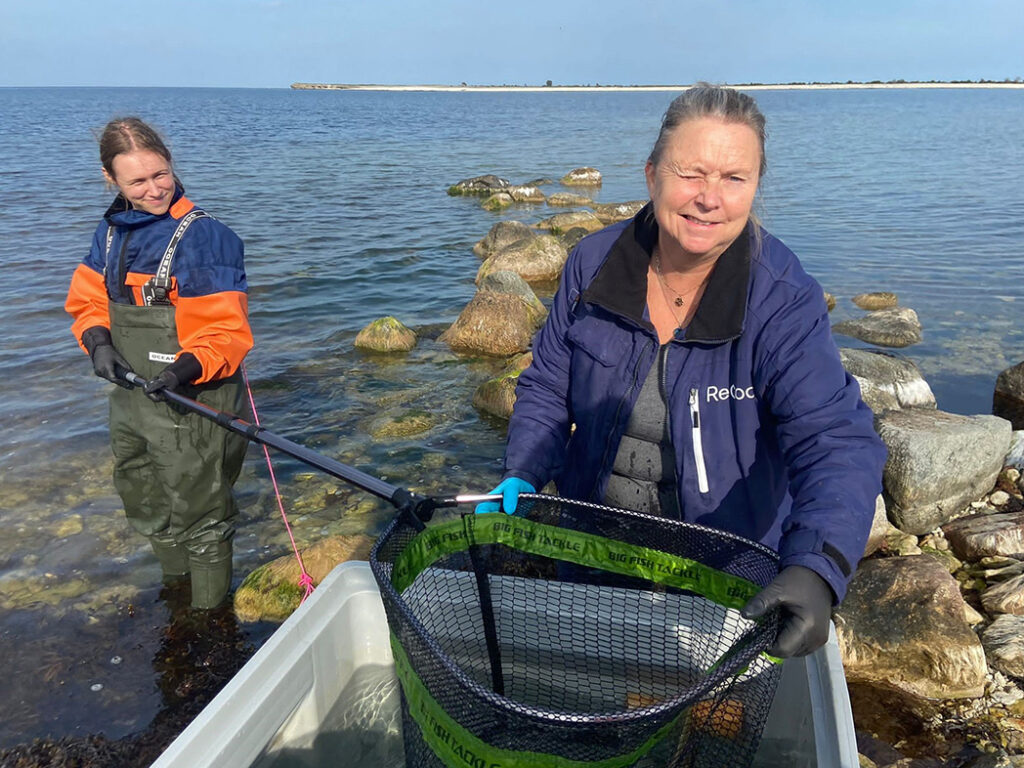
Susanne and her colleague Erika release parental cod into the Baltic Sea. Photo: Johanna Fröjd, BalticWaters
So what is the best thing about the job?
‘It’s fun to work with animals, especially fish. I have learnt so much about cod during the project! But above all, I feel that it is possible to read a lot from them – characteristics of the individuals, how they interact and how they feel. If a cod is stressed, it is clearly visible. They get a striped pattern in their skin that clearly communicates that things are not right,’ says Susanne.
How can you tell that a cod is doing well?
‘Obviously when they are eating with a good appetite. We who work with the fish keep our distance as much as possible because they are going to return to life in the wild, but it is inevitable that they get used to our presence, even if we limit it. Sometimes they can get up to mischief by giving you a proper splash. My interpretation is that this is a behavior that shows that they are safe. Similarly, they swim close to each other in groups when they are a little stressed, but venture more from the group when they are safe.’
But it has not always been easy. The RAS system is complicated and not many people in Sweden, or the world for that matter, knows how it works under the specific conditions at Ar and the ReCod project. If misadjusted, or if something in the system stops working, the consequences in the fish tanks can be devastating. It requires constant supervision and knowledge that can only be built up with time and experience. It also requires someone who is not afraid to roll up their sleeves.
’It’s a job that is carried out in the cold, it can be tough from time to time,’ says Susanne.
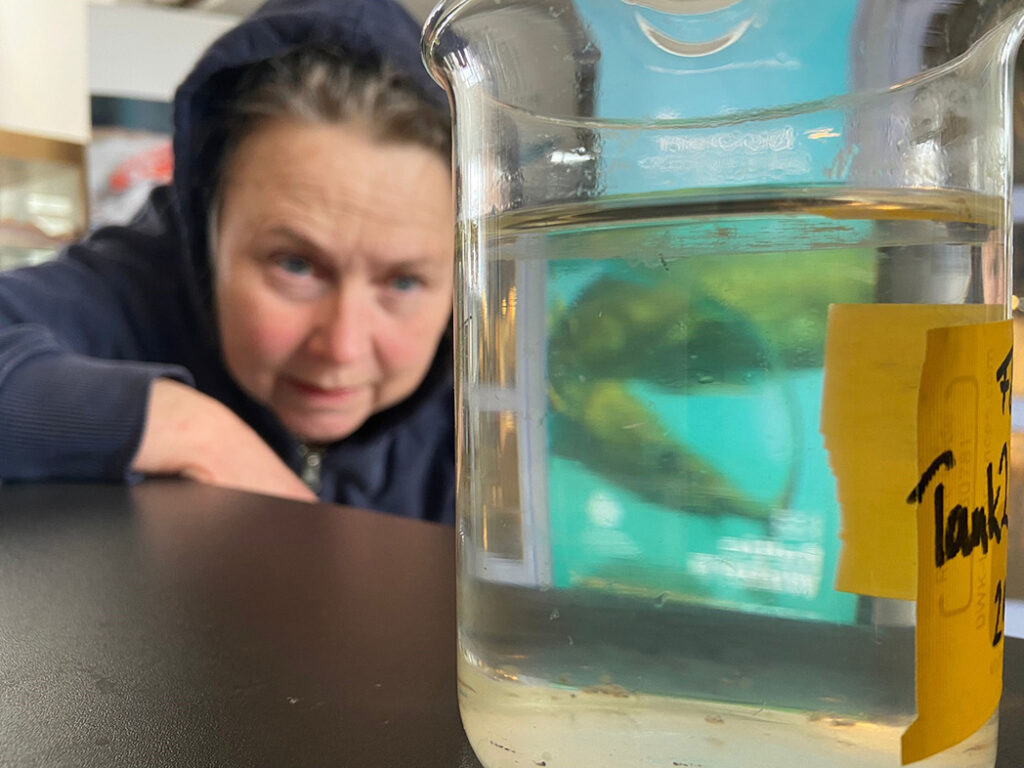
Newly hatched cod larvae. Photo: Johanna Fröjd, BalticWaters
At the same time, the job has provided something that is difficult to get elsewhere.
’I have gained a whole new relationship with, and insight into, marine life. I understand more, which has made me even more curious,’ says Susanne.
How does it feel now, when stage 1 of ReCod ends at Ar, to further develop in stage 2 at BalticWaters fish research laboratory outside Nyköping?
‘I’m retiring, which I’m looking forward to! But I wasn’t here when the last parental cod were released back into the Baltic Sea in August. When I came back, and they weren’t there, I felt it in my heart,’ says Susanne and gets teary-eyed.
Because the cod have left their mark. These amazing animals are impossible not to relate to when you meet them, especially as often as Susanne has done.
We thank Susanne for her invaluable contribution to the ReCod project and wish her a good retirement, although we know that the lazy days will be few. Susanne will continue to run her B&B, and plans to build a new greenhouse.
Quick facts
Name: Susanne Ragnarsdotter
Does: Operations assistant in the ReCod project at BalticWaters and runs Kustparkens B&B in Fårösund.
Background: Has worked at the Red Cross and at SWEDESD, Uppsala University on Campus Gotland as a project coordinator focusing on learning and education for sustainable development.
Favourite species in the Baltic Sea: Apart from cod –moon jellyfish.
What else would you like to know about cod? It would be very exciting if more research was done on the social interaction of cod, because they are such exciting creatures!

About ReCod
ReCod – release of small cod in the Baltic Sea is one of BalticWaters’ largest and longest projects, which started in 2020 and is planned to last until 2034 and is divided into three stages.
In 2020 – 2024, stage 1 was carried out at the Ar research station on Gotland – in the middle of the Baltic Sea. The goal of stage 1 is to conduct experiments with the release of 4–6-day-old cod larvae at several locations along the east coast to investigate whether the larvae survive and successfully establish themselves. If the experiments are successful, there is the possibility of reintroducing cod in the Baltic Sea at more locations, thereby increasing the chances of preserving and protecting the unique eastern stock.
ReCod stages 2 and 3 will be conducted at BalticWaters new fish research laboratory starting in autumn 2025. Cod larvae will be fed until the age of 30 days and then to juvenile fish for release and research. The aim is to find the age and size of fish best suited to survive in the wild.
ReCod is implemented and funded by BalticWaters, with support from Uppsala University and other partners.
